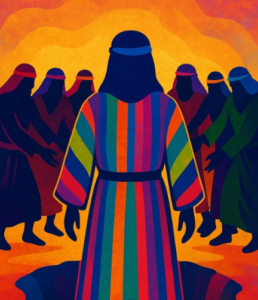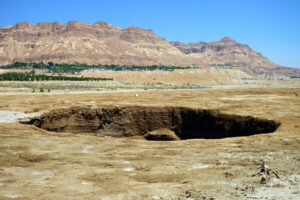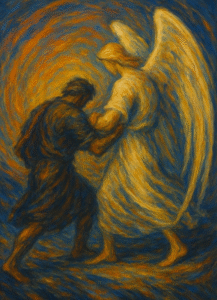For How Long Do We Have to Suffer? – Parshat Toldot
How much do we have to suffer because Esav honored his father? Is there a way to shorten the period of our suffering? This is the subject of this week’s Torah portion, Parshat Toldot.
Parshat Toldot discusses the brothers Jacob and Esav—the most diametrically opposed twins in the world, both spiritually and physically. The parsha describes at length the eternal struggle between them, which began at the moment they were conceived and will continue until the coming of the Messiah.
While Jacob was tamim (a simple, honest person) and “stayed in the tent” (spent all his time learning), Esav’s résumé, on the other hand, was an absolute disgrace. He was a murderer and a thief, and he would prey even on married women—the list of his criminal behavior was extensive. Consequently, it is quite astonishing that such an evildoer excelled in a such a precious mitzvah: Esav honored his father! The Midrash relates that whenever Esav came to bring Isaac food (after he had become blind in his old age), he would wear “bigdei chamudot” (distinguished clothing), which were so named because they had previously been owned by Nimrod, and Esav “chamad” (coveted, and later stole) them (a play on the double meaning of the word “chamad”). Nimrod would always be victorious in battle when he was wearing these clothes, on which the name of G-d was engraved. These are the garments that G-d made for the Adam and Eve after the Sin to protect them, as is mentioned in parshat Bereshit: “God made leather garments for Adam and his wife, and He clothed them” (Genesis 3:21). Particularly by wearing these clothes, Esav was doing the highest honor that he could for his father.
All the suffering that we, the Nation of Israel, have suffered in exile to this day is because of Esav. The Midrash relates (Tanchuma Kadoshim 15) that when Isaac told Esav that his brother Yaakov came and fraudulently took his blessings, Esav shed two tears and another half a tear. That is, two tears fell from his eyes and dripped down his cheeks and the third pooled up in the corner of his eye. The two Temples were destroyed because of these two tears, and to this day, after nearly two thousand years, we are still suffering due to this third tear. Until Esav’s merit for those tears is exhausted, the redemption will be delayed (Zohar II, 12:2).
But why are Esav’s tears so powerful, seeing that he was such a vile and dreadful murderer? It is all because of the honor that Esav showed his father. The Midrash adds that Esav was supposed to be wiped off the face of the earth immediately, but in the merit of the honor he showed his father, he was rewarded in this world with the blessing of abundance with which Isaac blessed him, but this merit will eventually run out, and then he will be eternally deprived of a portion in the World to Come (Bereshit Rabba 67:5).
So, what really caused Esav to honor his father? After all, he violated every prohibition in the world, so what caused him to be so careful about precisely this mitzvah?
In the Kabbalistic writings, it is brought (Sefer Machberet HaKodesh, Sha’ar Rosh Chodesh), that although Esav was bereft of spiritual deeds, he would yet be the source of holy and precious souls who would one day convert, among them one of the most famous figures in the Jewish world: Onkelos the convert who wrote the translation of the Torah into Aramaic. Also, from Esav came the Holy Tena’im (ancient sages), Shemayah and Avtalyon (who were the teachers of Hillel HaNasi), in addition to Rabbi Akiva, Rabbi Meir and more. This is hinted at in the verse “he would hunt with his mouth” (Genesis 25:28).
From here Rabbi Natan reveals to us an idea which is brought in the teachings of Rabbi Nachman that sheds light on the sublime mitzvah of honoring father and mother. Rabbi Nachman teaches:
The greatest honor for the Creator is when a soul that was far away comes close the Creator. The definition of a “distant soul” includes both Gentiles who convert and come to take refuge under the wings of the Divine Presence and also Jews who were far from having faith in the Creator and then drew close to Him. The Zohar teaches that when those who are far away come close to the Creator, His name is exalted and honored in all the worlds. When Yitro drew close and said: “Now I know that G-d is greater than all the other gods” (Exodus 18:11). “It was then that the Holy One Blessed Be He, went up and was made known in His greatness on high and below, and then the Torah was given in its entirety, that it may reign over all” (Zohar, Yitro 69:1).
It is all because of the honor that Esav showed his father, but this merit will eventually run out, and then he will be eternally deprived of a portion in the World to Come
This means that before those who were distant came closer to G-d, the honor of the Creator was at a low point and in exile. But at the time of the redemption, everyone will draw close to the Creator, and the glory of the Creator will increase throughout the world, and then the verse will be fulfilled: “And the earth was lit up by His Presence” (Ezekiel 43:2).
The way to bring those who are distant, closer to the Creator is through the Torah, which has “60 ribo” (600,000) letters. When one studies the Torah properly, he illuminates the letters of the Torah, and they shine spiritual enlightenment from one to another and this creates a spiritual unification. This enlightenment radiates to the souls of the converts and awakens them to draw close to the Creator and join the Jewish people.
Rabbi Nachman teaches that there are Jewish souls who are rooted in the letters of the Torah, and their souls are completely pure. However, the souls of the converts are impure, as they are covered in coarse, physical garments which are referred to as “soiled garments.” These unclean garments prevent these souls from reaching their true destination. They have to endure a long and tedious process in order to reach their spiritual goal, more so than those who are born into holiness. On the verse, “And if you honor it [here, referring to Shabbat]” (Isaiah 58:13), our sages learned out: honor it by wearing clean garments. Honor is dependent on wearing clean garments. So too, the Divine Honor depends on the souls of converts and those who are far away from holiness. When they are eventually purified, G-d’s Honor is even more exalted. When this process reaches its full completion, the redemption will come, as it is written about the future: “And the earth was lit up by His Presence” (Likutei Moharan I, 14).
Now let us go a step further. The Torah compares honoring one’s parents to honoring G-d. When a person honors his father and mother, he merits to draw down an illumination to his soul, as is written in the Kabbalistic writings that the father and mother provide garments for the souls of their children. When a person shows honor towards his father and mother, he merits to draw down honor upon himself, as is written in the verse: “for those who honor Me shall I honor” (Samuel I, 2:30). When a person honors his father and mother, he himself merits to an act of honor, meaning that his soul is purified, cleansed, and directed more towards G-d’s honor, and this in turn reveals G-d’s honor.

Because of two and a half tears we suffer to this day…
Now we can return to our parsha and understand what happened when Esav carried out, to some extent, the mitzvah of honoring his father.
As we have seen, the way to draw down spiritual enlightenment to the soul is through the commandment to honor one’s father and mother. This is why the sparks of the souls of converts who were to be found in Esav desperately wanted to merit to clean garments for their souls, and they were the force that pushed Esav to honor his father Isaac, so that their souls would merit to be cleansed and to reach their goal of coming close to the Creator. Clean garments are the equivalent of the wings of a mitzvah, which are the souls of the converts. This idea is reflected in the expression that we are all familiar with regarding converts: “to find shelter under the wings of the Shechina (Divine Presence).”
This connects well with the words of our sages: “Israel was only exiled amongst the nations of the world in order to gather from them converts” (Pesachim 87b). As stated, the reason why we are forced to linger in exile is because of those souls who were contained within Esav and who desperately wanted to fulfill the mitzvah of honoring one’s father in order to merit being rectified. As long as we are in the exile of Rome (“Edom,” the descendants of Esav) it is considered as Esav being rewarded for fulfilling the mitzvah of honoring his father. As soon as these souls are rectified, all the sparks of holiness will exit from him, and they will become righteous converts. This will be a complete reckoning of the payment to Esav for fulfilling the commandment to honor his father.
This is the solution to hasten the final redemption and salvation of the Nation of Israel. The more we enlighten the fallen souls who are sunk in the depths of the klippot of Esav—those souls who from the beginning were under Esav’s control and also those who fell into Esav’s hands as a result of their sins, the precious lost souls who were subjugated by “the lowliness of the exile”—the more souls will escape from Esav’s grasp by returning and repenting and thus merit being redeemed, recognizing the Creator of the World and returning to their root in holiness. And then they will fulfill the verse: “And saviors shall ascend Mt. Zion to judge the mountain of Esav, and the Lord alone shall be King” (Obadiah 1:21). And then the verse will be fulfilled: “And the earth was lit up by His Presence.” Amen and amen.
(Based on Likutei Halachot, Kibbud Av v’Em 3)
- blessingsbreslevBreslovdestructions of templedistant soulDivine PresencDvar Torah for Parshat ToldotexilefeaturedFirst and Second Templeshonor of the CreatorJewishJewish soulsjudaismKlippotLikutey HalachotLikutey MoharanMt. ZionNation of Israelparshat toldotReb NosonRebbe Nachmanredemptionrefugesalvationspiritualitytearsthree fatherstoldostoldotTorah PortiontwinsYaakov and Esavyitro
- 0 comment






















